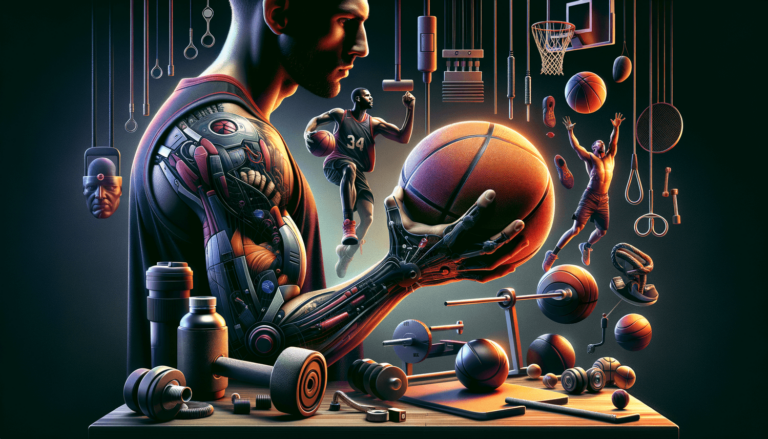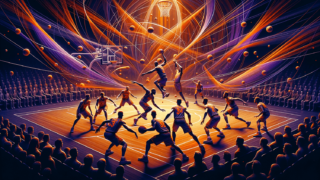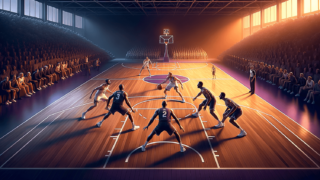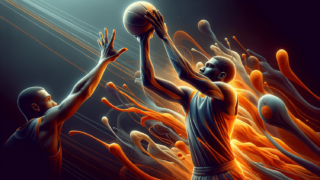
How to Improve Your Basketball Off-Court Work Ethic?
Written by: Basketball Universe
Last updated:

Are you eager to take your basketball game to new heights but struggling to find the time and guidance to improve on the court? Look no further, because the key to unlocking your full potential doesn’t end at the gymnasium doors. Mastering the off-court work ethic is as critical to your basketball journey as any perfectly executed dribble or jump shot. Strap on your sneakers and get ready to explore the fascinating world of off-court preparation, as we dive into the essential routines and habits that’ll transform you into a powerhouse on the hardwood. In this fun and professional blog post, we’ll guide you on the ins and outs of refining your off-court work ethic to ensure you shine brighter than the championship trophies that await you in your future.
How to Improve Your Basketball Off-Court Work Ethic?
To improve your basketball off-court work ethic, focus on developing a growth mindset, setting clear goals, and maintaining a consistent routine. Incorporate strength and conditioning exercises, practice mental skills, analyze game performances, and prioritize rest and recovery. Additionally, seek out mentorship and learn from the experiences of others in the basketball community. Emphasizing these aspects will lead to significant improvement in your on-court performance and overall work ethic.
Establishing a Growth Mindset
Improving your off-court work ethic begins with cultivating a growth mindset. The power of believing in your ability to learn and grow not only shapes your attitude but also impacts your performance on the basketball court. Adopting a growth mindset will help you embrace challenges, persist in the face of setbacks, and see effort as a path to mastery.
Challenge Your Limitations
Rather than perceiving your weaknesses as limitations, approach them as opportunities for improvement. Make a list of areas in your basketball game that need enhancement and create a plan to work on them. For example, if ball-handling is a weak spot, devote time to specific drills and practices to develop those skills. Embrace the challenge and have fun while gaining proficiency in areas that were once struggles.
Leverage Constructive Criticism
Accepting feedback from coaches, teammates, and mentors is crucial to your development. Use constructive criticism as a tool to identify gaps in your basketball performance and work proactively to bridge them. Develop the habit of actively seeking feedback and using it to refine your skills and approach.
Setting Clear Goals and Consistency
Establishing specific, measurable, achievable, relevant, and time-bound (SMART) goals is an essential aspect of improving your basketball off-court work ethic. Having a clear understanding of what you want to accomplish provides structure and motivation during your journey to becoming a better basketball player.
Short-Term and Long-Term Goals
Break down your aspirations into short-term and long-term goals. Short-term goals might include enhancing particular skills or adopting healthier habits, while long-term goals could involve making a competitive team or earning a scholarship. Continuously revisiting and adjusting these goals will keep you motivated and focused on your basketball journey.
Consistency is Key
Achieving your basketball-related goals requires dedication and a consistent work ethic. Develop a routine incorporating skills training, strength and conditioning, and mental skills practice. Consistency in your off-court efforts will yield positive results when it’s time to put your skills to the test on the court.
Strength and Conditioning
Building athletic prowess is crucial for basketball players. A strong, agile, and powerful body is the foundation of a successful basketball career. Devote time to strength and conditioning routines that will improve your on-court performance.
Functional Strength Training
Functional strength training prepares your body to withstand the physical demands of basketball. Exercises such as squats, lunges, and plyometrics will help improve your overall strength, power, and stability. Incorporate these movements into your off-court workout regimen to enhance both your endurance and resilience on the court.
Cardiovascular Fitness
Basketball requires sustained effort and bursts of speed throughout the game. Incorporate activities like running, biking, or swimming into your off-court routine to build cardiovascular endurance. Interval training is highly effective for basketball-specific conditioning, as it mimics the fast breaks and quick changes in intensity experienced during gameplay.
Develop Mental Skills and Basketball IQ
Intelligence and mental fortitude are just as critical to your success on the court as physical abilities. Incorporating mental skills training into your off-court work ethic will help you stay focused, confident, and composed in high-pressure situations.
Mental Visualization
Visualization is a powerful technique used by elite athletes to enhance their performance. Imagine yourself executing perfect plays, making clutch shots, and outperforming your opponents. Consistent mental practice helps train your brain to perform at its best when it’s time to step on the court.
Embracing Pressure
Basketball involves high-stress situations, such as a tight game, the final seconds ticking away, and everything riding on your performance. Developing the ability to stay calm and focused under pressure is a crucial aspect of being a successful basketball player. Incorporate mindfulness and meditation techniques into your off-court routine to improve your composure during high-pressure moments on the court.
Analyze Performance and Learn from Others
To reach your full potential, it’s important to reflect on your own performances and learn from other accomplished basketball players. By analyzing your past games and observing more experienced players, you can identify key areas to focus on during your off-court practice sessions.
Review Game Footage
Regularly reviewing game footage is a powerful tool for identifying strengths and weaknesses in your basketball performance. Pay close attention to your shooting form, decision-making, positioning, and overall teamwork. Use the insights gained from this analysis to adapt your off-court work and improve your on-court results.
Study Top Performers
Learn from those who have already achieved success in basketball. Watch players who excel in aspects you struggle with and identify the techniques, habits, and approaches they use to thrive. Emulate their successes and apply what you learn to your own game.
Prioritizing Rest and Recovery
Lastly, improving your off-court work ethic doesn’t always mean pushing yourself to the limit. Giving your body and mind ample time to recover is essential for maintaining peak performance and avoiding burnout. Ingrain proper rest and recovery techniques into your routine to ensure long-term success in basketball.
Optimize Sleep and Nutrition
Getting enough sleep and fueling your body with wholesome nutrition are critical for repairing muscles, improving cognitive function, and maintaining overall well-being. Prioritize a nutrient-dense diet and adequate sleep as vital components of your off-court work ethic.
Active Recovery and Mobility Training
Integrating active recovery techniques such as foam rolling and yoga into your off-court routine is crucial to maintaining flexibility and preventing injuries. Ensuring your muscles are agile and limber allows you to perform at your best on the basketball court.
Embrace Mentorship and Expand Your Network
Guidance from experienced mentors and forming connections with like-minded individuals are invaluable assets for improving your off-court work ethic. Seek out coaches, trainers, and fellow players who can provide feedback, support, and insights into becoming the best basketball player you can be.
Mentors and Coaches
Honing your skills under the guidance of knowledgeable and experienced basketball mentors has a profound impact on your development as a player. Engage with coaches and trainers who can help you set clear goals and develop a personalized roadmap to success.
Networking with Fellow Players
Surrounding yourself with fellow basketball enthusiasts fosters a supportive environment for growth and self-improvement. Engage with players of varying skill levels, and learn from their experiences to enhance your off-court work ethic and, ultimately, your performance on the court.
By following these essential steps for improving your basketball off-court work ethic, you will observe positive changes in your on-court performance. Embrace the journey, enjoy the process, and watch yourself become a standout presence in the world of basketball.
Developing Leadership Skills
Off-court work ethic doesn’t solely revolve around improving your physical and mental abilities. Excelling as a basketball player also requires strong leadership skills to inspire and guide your teammates. Cultivating these capabilities is essential to becoming a well-rounded player, both on and off the court.
Effective Communication
Efficient communication is crucial for executing plays, motivating your teammates, and overcoming challenges on the court. Work on building active listening skills, demonstrating empathy, and respecting diverse perspectives. Practice using clear and concise language to communicate your thoughts assertively and respectfully.
Leading by Example
Set an example for others by consistently displaying strong commitment, effort, and enthusiasm during practices, games, and off-court team events. Demonstrating dedication and perseverance will encourage your teammates to follow suit, cultivating a culture of hard work and passion for the game.
Exploring Additional Resources
Broadening your knowledge of basketball by exploring additional resources can provide valuable insights and further enhance your off-court work ethic. Delve into books, podcasts, and videos to increase your understanding of the game’s intricacies, as well as personal and professional development strategies.
Books and Articles
There is an abundance of literature on basketball, ranging from technical instruction to inspiring success stories. Dedicate time to reading about game strategies, training methods, and the experiences of professional basketball players. Reading about others’ journeys will enrich your own and expand your perspective on the game and the path to success.
Podcasts and Videos
Learning through auditory and visual formats can be equally beneficial. Engage with basketball-specific podcasts and YouTube channels as alternative methods to acquire knowledge and inspiration from coaches, trainers, and players. Use these resources to explore diverse topics like nutrition, sports psychology, and basketball history.
Customize Your Off-Court Training
An effective off-court work ethic should be tailored to your individual needs and goals. Assess your unique strengths and weaknesses and design a personalized approach to improvement, ensuring optimal results on the court.
Focus on Position-Specific Skills
While a well-rounded skill set is essential, it is also important to develop expertise in position-specific skills. For example, guards should place emphasis on ball-handling and perimeter shooting, while post players should concentrate on rebounding and effective post moves. By honing these specialized skills, you’ll be better equipped to contribute to your team’s success.
Risk Assessment and Injury Prevention
Get to know your body to avoid unnecessary risks and injuries during off-court training. Consult with sports medicine professionals and personal trainers to create a balanced and safe training regimen. Prioritize injury prevention techniques, such as dynamic warm-ups, strength training, and flexibility exercises, to remain healthy and reinforce your off-court work ethic.
By incorporating the aforementioned elements into your off-court training, you will create a comprehensive and multifaceted program focused on personal growth and on-court success. Remember that your development as a basketball player is an ongoing process, so stay curious, committed, and enjoy the journey.
FAQ: Improving Your Basketball Off-Court Work Ethic
You may have some questions regarding basketball off-court work ethic, so we’ve compiled a list of frequently asked questions with concise answers to help you better understand this critical aspect of a player’s development. Let’s dive in!
1. How important is off-court work ethic compared to on-court practice?
Off-court work ethic is just as important as on-court practice in developing your basketball skills. It builds your physical, mental, and leadership abilities, which are essential for overall improvement and on-court performance.
2. How much time should I dedicate to off-court training?
There is no one-size-fits-all answer, as the time commitment varies depending on individual goals and schedules. The key is to strike a balance between off-court development activities and on-court practice, while still making time for essential rest and recovery.
3. What specific skills should I focus on improving off the court?
Your focus should be on skills specific to your position, as well as more generalized abilities. Concentrate on areas such as ball-handling, shooting, defense, conditioning, strength training, mental skills, leadership, and basketball IQ.
4. Can off-court training help me recover from an injury?
Yes, off-court work can aid your recovery process. It’s crucial to consult with healthcare professionals to create a safe, customized rehabilitation program that includes strength, flexibility, and mobility exercises, as well as activities that enhance mental resilience.
5. How can I stay motivated with my off-court work ethic?
Setting SMART (specific, measurable, achievable, relevant, and time-bound) goals, maintaining consistency, and keeping track of your progress will help you stay motivated. Surround yourself with a supportive community of coaches, mentors, and fellow players to maintain your enthusiasm and commitment.
6. How can I fit off-court work into my already busy schedule?
Develop a routine that integrates basketball-related activities into your daily life. Prioritize tasks, set realistic expectations, and remain flexible in adjusting your schedule as needed. You can also explore creative ways to incorporate different training aspects, such as listening to basketball podcasts during your commute.
7. Why should I focus on mental skills when I’m not playing?
Mental skills play a significant role in your performance during games, as well as your long-term development. Off-court mental training helps you stay focused, confident, and composed under pressure while also improving your resilience and decision-making abilities.
8. How can I improve my communication skills for better on-court teamwork?
Building effective communication skills involves active listening, demonstrating empathy, and assertive expression of thoughts. Consider enrolling in public speaking courses, participating in team-building activities, and engaging in regular conversations with your teammates and coaches to develop these important skills.
9. Why should I analyze game footage and learn from others?
Reviewing game footage provides valuable insights into your strengths and weaknesses, helping you target specific areas for improvement. Learning from accomplished players and their experiences can offer new perspectives, ideas, and techniques to enhance your own game.
10. What role does nutrition play in off-court training?
Proper nutrition fuels your body, providing the energy and resources needed to perform at your best, both on and off the court. A nutrient-dense diet supports muscle growth, recovery, and overall well-being, while also impacting your focus, energy levels, and stamina.
Featured Posts
- No pillar pages found.





